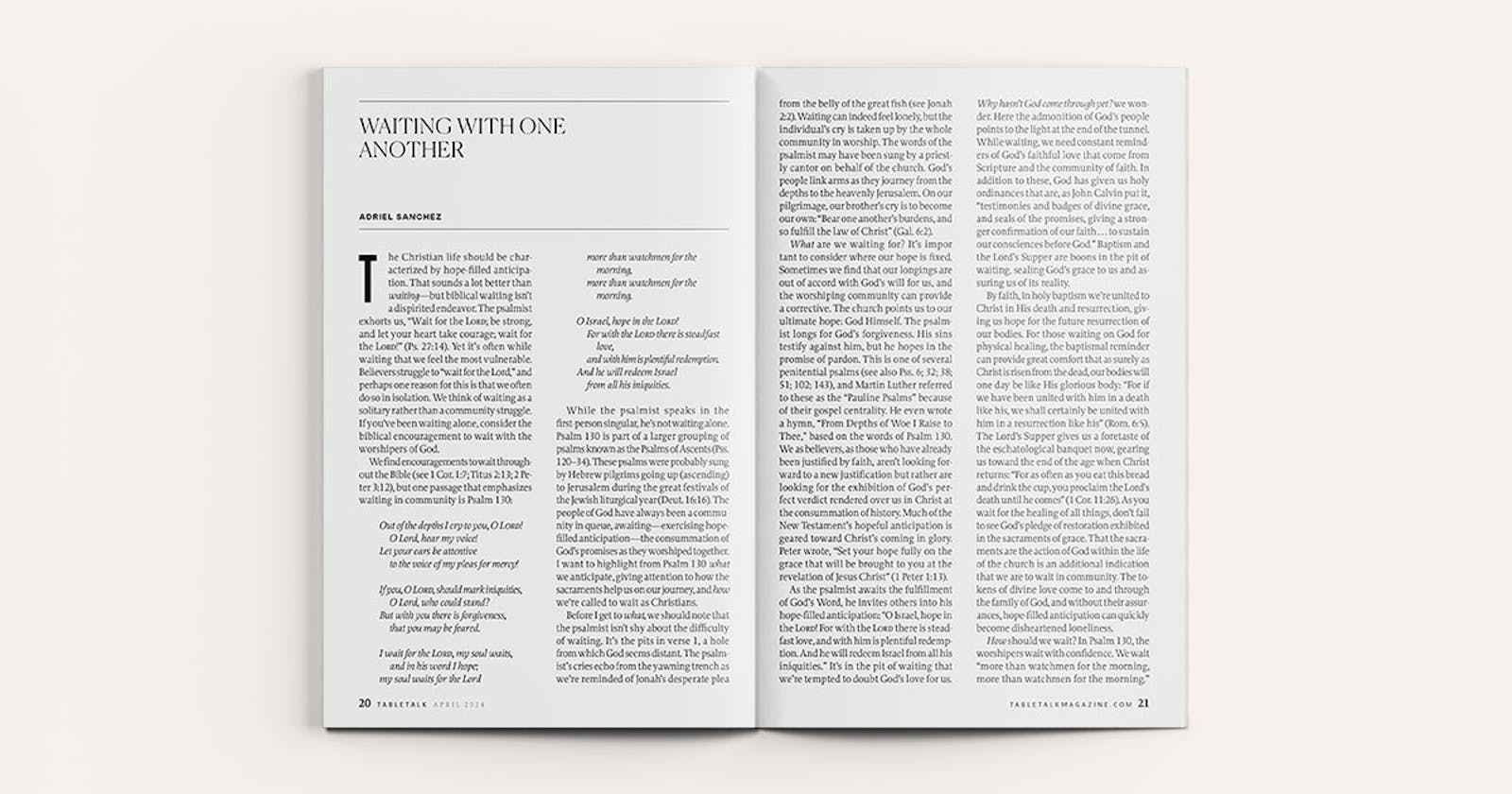
Request your free, three-month trial to Tabletalk magazine. You’ll receive the print issue monthly and gain immediate digital access to decades of archives. This trial is risk-free. No credit card required.
Try Tabletalk NowAlready receive Tabletalk magazine every month?
Verify your email address to gain unlimited access.
The Christian life should be characterized by hope-filled anticipation. That sounds a lot better than waiting—but biblical waiting isn’t a dispirited endeavor. The psalmist exhorts us, “Wait for the Lord; be strong, and let your heart take courage; wait for the Lord!” (Ps. 27:14). Yet it’s often while waiting that we feel the most vulnerable. Believers struggle to “wait for the Lord,” and perhaps one reason for this is that we often do so in isolation. We think of waiting as a solitary rather than a community struggle. If you’ve been waiting alone, consider the biblical encouragement to wait with the worshipers of God.
We find encouragements to wait throughout the Bible (see 1 Cor. 1:7; Titus 2:13; 2 Peter 3:12), but one passage that emphasizes waiting in community is Psalm 130:
Out of the depths I cry to you, O Lord!
O Lord, hear my voice!
Let your ears be attentive
to the voice of my pleas for mercy!If you, O Lord, should mark iniquities,
O Lord, who could stand?
But with you there is forgiveness,
that you may be feared.I wait for the Lord, my soul waits,
and in his word I hope;
my soul waits for the Lord
more than watchmen for the morning,
more than watchmen for the morning.O Israel, hope in the Lord!
For with the Lord there is steadfast love,
and with him is plentiful redemption.
And he will redeem Israel
from all his iniquities.
While the psalmist speaks in the first-person singular, he’s not waiting alone. Psalm 130 is part of a larger grouping of psalms known as the Psalms of Ascents (Pss. 120–34). These psalms were probably sung by Hebrew pilgrims going up (ascending) to Jerusalem during the great festivals of the Jewish liturgical year (Deut. 16:16). The people of God have always been a community in queue, awaiting—exercising hope-filled anticipation—the consummation of God’s promises as they worshiped together. I want to highlight from Psalm 130 what we anticipate, giving attention to how the sacraments help us on our journey, and how we’re called to wait as Christians.
Before I get to what, we should note that the psalmist isn’t shy about the difficulty of waiting. It’s the pits in verse 1, a hole from which God seems distant. The psalmist’s cries echo from the yawning trench as we’re reminded of Jonah’s desperate plea from the belly of the great fish (see Jonah 2:2). Waiting can indeed feel lonely, but the individual’s cry is taken up by the whole community in worship. The words of the psalmist may have been sung by a priestly cantor on behalf of the church. God’s people link arms as they journey from the depths to the heavenly Jerusalem. On our pilgrimage, our brother’s cry is to become our own: “Bear one another’s burdens, and so fulfill the law of Christ” (Gal. 6:2).
What are we waiting for? It’s important to consider where our hope is fixed. Sometimes we find that our longings are out of accord with God’s will for us, and the worshiping community can provide a corrective. The church points us to our ultimate hope: God Himself. The psalmist longs for God’s forgiveness. His sins testify against him, but he hopes in the promise of pardon. This is one of several penitential psalms (see also Pss. 6; 32; 38; 51; 102; 143), and Martin Luther referred to these as the “Pauline Psalms” because of their gospel centrality. He even wrote a hymn, “From Depths of Woe I Raise to Thee,” based on the words of Psalm 130. We as believers, as those who have already been justified by faith, aren’t looking forward to a new justification but rather are looking for the exhibition of God’s perfect verdict rendered over us in Christ at the consummation of history. Much of the New Testament’s hopeful anticipation is geared toward Christ’s coming in glory. Peter wrote, “Set your hope fully on the grace that will be brought to you at the revelation of Jesus Christ” (1 Peter 1:13).
As the psalmist awaits the fulfillment of God’s Word, he invites others into his hope-filled anticipation: “O Israel, hope in the Lord! For with the Lord there is steadfast love, and with him is plentiful redemption. And he will redeem Israel from all his iniquities.” It’s in the pit of waiting that we’re tempted to doubt God’s love for us. Why hasn’t God come through yet? we wonder. Here the admonition of God’s people points to the light at the end of the tunnel. While waiting, we need constant reminders of God’s faithful love that come from Scripture and the community of faith. In addition to these, God has given us holy ordinances that are, as John Calvin put it, “testimonies and badges of divine grace, and seals of the promises, giving a stronger confirmation of our faith . . . to sustain our consciences before God.” Baptism and the Lord’s Supper are boons in the pit of waiting, sealing God’s grace to us and assuring us of its reality.

By faith, in holy baptism we’re united to Christ in His death and resurrection, giving us hope for the future resurrection of our bodies. For those waiting on God for physical healing, the baptismal reminder can provide great comfort that as surely as Christ is risen from the dead, our bodies will one day be like His glorious body: “For if we have been united with him in a death like his, we shall certainly be united with him in a resurrection like his” (Rom. 6:5). The Lord’s Supper gives us a foretaste of the eschatological banquet now, gearing us toward the end of the age when Christ returns: “For as often as you eat this bread and drink the cup, you proclaim the Lord’s death until he comes” (1 Cor. 11:26). As you wait for the healing of all things, don’t fail to see God’s pledge of restoration exhibited in the sacraments of grace. That the sacraments are the action of God within the life of the church is an additional indication that we are to wait in community. The tokens of divine love come to and through the family of God, and without their assurances, hope-filled anticipation can quickly become disheartened loneliness.
How should we wait? In Psalm 130, the worshipers wait with confidence. We wait “more than watchmen for the morning, more than watchmen for the morning.” Nothing is surer than that the sun will rise at dawn. The watchman knows that his shift will end and that his rest is on the horizon. We “have the prophetic word more fully confirmed, to which you will do well to pay attention as to a lamp shining in a dark place, until the day dawns and the morning star rises in your hearts” (2 Peter 1:19). Biblical waiting clings with hope to the sure promise of God to save those who have put their trust in Him. “He will redeem Israel from all his iniquities.” God’s grace rises each morning as surely as the sun, but it burns brighter and hotter. Sometimes we fail to discern its rays when we’re alone, so we need a brother or sister to say, “Look up!”
As we worship, God directs us away from ourselves and lifts us up to Jesus where the promises of God find their confirmation (2 Cor. 1:20). Jesus can sympathize with your patient waiting. When He suffered, He continued entrusting Himself to the Father (1 Peter 2:23). The Son of God knows what it feels like to be in the pit, far removed from the sensation of heavenly benevolence. It was the hope-filled anticipation of redeeming His bride that sustained Him during His passion (Heb. 12:2), and now His ears are attentive to your pleas for mercy. Since you have such a High Priest, wait in hope-filled anticipation of His steadfast love, and invite the whole community of faith to enter that confident expectation with you.
